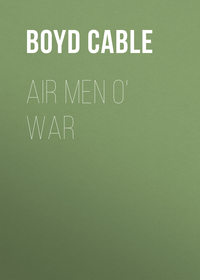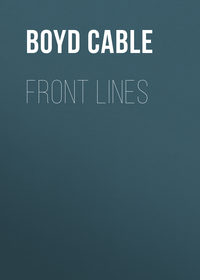 полная версия
полная версияGrapes of wrath
“If there’s any bloomin’ Germans left on that ground,” said Pug cheerfully, “I’d like to know ’ow they do it. Seems to me a perishin’ black-beetle in a ’ole could not ’ave come through that shell fire if ’e ’ad as many lives as a cat.”
It almost looked as if he was right, and that the defense had been obliterated by the artillery preparation, for when the order came along and the British Infantry began to scramble hurriedly over the parapet, to make their way out through the wire, and to form up quickly and roughly on the open ground beyond it, hardly a shot was fired at them, and there was no sound or sign of life in the German trenches except the whirling smoke clouds starred with quick flashes of fire from the shells that still streamed overhead and battered and hammered down on the opposite lines.
The infantry lay down in the wet grass and mud for another two or three minutes, and then, suddenly and simultaneously, as if all the guns had worked together on the pulling of a string, the shells, without ceasing for an instant to roar past overhead, ceased to flame and crash on the forward lines, but began to pound down in a belt of smoke and fire some hundreds of yards beyond. Along the length of the British line whistle after whistle trilled and shrieked; a few figures could be seen leaping to their feet and beginning to run forward; and then with a heave and a jumble of bobbing heads and shoulders the whole line rose and swung forward in a long, uneven, but almost solid wave. At the same instant the German trenches came to life, a ragged volley of rifle fire crackled out, grew closer and quicker, swelled into one tumultuous roll with the machine guns hammering and rapping and clattering sharply and distinctly through the uproar. About the ears of the running infantry could be heard the sharp hiss and zipp and whistle and whine of passing bullets; from the ground amongst their feet came the cracking and snapping of bullets striking and the spurts of mud thrown up by them. At first these sounds were insignificant, and hardly noticed in the greater and more terrifying clamor of the guns’ reports, the shriek and whoop of the passing shells, the crashing bursts of their explosions. But the meaning and significance of the hissing bullet sounds were made swiftly plain as the rifle and machine-gun fire grew, and the riflemen and machine gunners steadied to their aim and task. The bullet storm swept down on the charging line, and the line withered and melted and shredded away under it. It still advanced steadily, but the ground behind it was dotted thicker and closer and more and more quickly with the bodies of men who fell and lay still, or crawled back towards their parapet or to the shelter of the nearest shell crater. The line went on, but half-way across the open ground it began to show ragged and uneven with great gaps sliced out of it at intervals. The wet ground was heavy going, and the fierceness of the fire and the numbers struck down by it began to make it look a doubtful question whether a sufficient weight of men could reach their goal to carry the charge home with any effect. From one cause or another the pace slowed sensibly, although the men themselves were probably unaware of the slowing.
Kentucky, Larry, and Pug kept throughout within arm’s length of one another. They had set out under the same bargain to keep close and help one another if need arose; but Kentucky at least confesses that any thoughts of a bargain, any memory of an arranged program, had completely left him, and very probably his thoughts ran in much the same direction as three-fourths of the charging line. His whole mind, without any conscious effort of reasoning, was centered on getting over the open as quickly as possible, of coming to hand grips with the Germans, of getting down into their trench out of reach of the sleeting bullets that swept the open. He arrived at the conclusion that in the open he was no more than a mere helpless running target for shells and bullets; that once in the German trench he would be out of reach of these; that if the trench were held and it came to hand-to-hand fighting, at least he would stand an equal chance, and at least his hand could guard his head. How many men he might have to meet, what odds would be against him, whether the attackers would be thinned out to a hopeless outnumbering, he hardly troubled to think. That need could be met as it arose, and in the meantime the first and more imperative need was to get across the open, to escape the bullets that pelted about them. He ran on quite unconscious of whether the rest of the line was still advancing, or whether it had been exterminated. Arrived at the wrecked entanglements of wire he did look round, to find Larry and Pug close beside him, and all three plunged into the remains of the entanglement almost side by side, and began to kick and tear a way over and through the remaining strands and the little chopped fragments that strewed the ground.
Kentucky was suddenly aware of a machine-gun embrasure almost in front of them, placed in an angle of the trench so as to sweep the open ground in enfilade. From the blackness of the embrasure mouth flashed a spitting stream of fire, and it came to him with a jerk that on the path he was taking he would have to cross that stream, that the bullets pouring from it must inevitably cut down his two companions and himself. He turned and shouted hoarsely at them, swerved to one side, and slanted in to the trench so as to escape the streaming fire; but, looking round, he saw that the other two had not heard or heeded him, that they were still plowing straight on through the broken wires, that another few paces must bring them directly in the path of the bullets’ sweep. He yelled again hoarsely, but realized as he did so that his voice was lost and drowned in the clamor of the battle. But at that instant – and this was the first instant that he became aware of others beside the three of them having come so far – a man plunged past him, halted abruptly, and hurled something straight at the black hole of the embrasure. The bomb went true to its mark, the embrasure flamed out a broad gush of fire, a loud report boomed thunderously and hollowly from it – and the spitting fire stream stopped abruptly.
Kentucky ran on, leaped at the low parapet, scrambled on top of it, swung the point of his bayonet down, and poised himself for the leap. Below him he saw three faces staring upward, three rifle muzzles swing towards him and hang, as it seemed, for an eternity pointed straight at his face.
His mind was so full of that overpowering thought it had carried all the way across the open, the desperate desire to get down into the trench, that, confronted by the rifle muzzles and the urgent need to do something to escape them, he could not for the moment readjust his thoughts or rearrange his actions. The instant’s hesitation might easily have been fatal, and it is probable he owed his life to another man who at that moment leaped on the broken parapet and jostled him roughly just as two of the rifles below flamed and banged. As he half reeled aside from that jolting elbow he felt a puff of wind in his face, was conscious of a tremendous blow and violent upward leaping sensation somewhere about his head, a rush of cold air on his scalp. His first foolish thought was that the top of his head had been blown away, and he half dropped to his knees, clutching with one hand at his bare head, from which the shot had whirled his helmet. And as he dropped he saw beside him on the parapet the man who had jostled him, saw the swift downward fling of his hand as he hurled something into the trench and instantly flung himself to ground. Kentucky realized what the bomber was doing just in time to duck backwards. A yell from the trench below was cut short by a crashing report, a spout of flame and smoke shot up, and the parapet trembled and shuddered. The bomber leaped to his feet and without a word to Kentucky leaped across the trench and ran along its further side, swinging another bomb by its stick-handle. He carried a lot more of these hanging and dangling about his body. They jerked as he ran, and it flashed across Kentucky’s mind to wonder if there was no possibility of two of them by some mischance striking and detonating one another, or the safety pins jolting out, when he saw the man crumple suddenly and fall sprawling and lie still where he fell. Reminded abruptly of his exposed position and of those significant whiskings and swishings through the air about him, Kentucky jumped to his feet, glanced over into the trench, and jumped down into it. At the moment he could see no other British soldier to either side of him, but in the trench bottom lay the three bodies of the men killed by the bomb. A sudden wild and nervous doubt shot into his mind – could he be the only man who had safely reached the trench? But on the same instant he heard cries, the rush of feet, and two or three men leaped over and down into the trench beside him, and he caught a glimpse of others doing the same further along.
“Seen any of ’em?” gasped one of the newcomers, and without waiting an answer, “Come along, men; work along the trench and look out for dug-outs.”
Kentucky recognized them as men of another company of the Stonewalls, saw that they, too, were loaded with bombs, and because he was not at all sure what he ought to do himself, he followed them along the trench. The bombers stopped at the dark entrance to a dug-out, and the officer leading them halted and shouted down it. In reply a rifle banged and a bullet hissed out past the officer’s head. The men swore, stepped hurriedly aside, and one of them swung forward a bomb with long cloth streamers dangling from it. “Not that,” said the officer quickly. “It’ll explode on the stairs. Give ’em two or three Mills’ grenades.” The men pulled the pins from the grenades and flung them down the stairway and the rifle banged angrily again. “That’s about your last shot,” said one of the men grimly, and next instant a hollow triple report boomed out from deep below. “Roll another couple down to make sure,” said the officer, “and come along.”
Kentucky remembered the episode of the double entrance to the dug-out in the other trench. “There may be another stair entrance further along,” he said quickly. “Come on,” said the officer abruptly, “we’ll see. You’d better come with us and have your bayonet ready. I’ve lost my bayonet men.” He led the way himself with a long “trench dagger” in his hand – a murderous looking long knife with rings set along the haft for his fingers to thrust through and grip. Kentucky heard a shout of “C Company. Rally along here, C.”
“I’d better go, hadn’t I?” he asked. “I’m C, and they’re shouting for C.”
“All right,” said the officer, “push off. Pick up that rifle, one of you. It’s a German, but it’ll do for bayonet work if we need it.”
Kentucky had no idea where “C” Company was calling from, and down in the trench he could see nothing. For a moment he was half inclined to stay where he was with the others, but the shout came again, “C Company. Along here, C.” He scrambled up the broken rear wall of the trench, saw a group of men gathering along to the right, heard another call from them, and climbed out to run stooping across and join them.
“Hello, Kentucky,” he heard, “where you bin? Thought you was a wash-out.”
“I’m all hunkadory, Pug,” he answered joyfully. “I missed you coming across just after that bomber slung one in on the machine gun. Lucky thing for you he did, too.”
“Hey?” said Pug vaguely, “wot bomber, an’ wot machine gun?”
“Well, I didn’t think you could have missed seeing that,” said Kentucky in astonishment. “You and Larry were running right across its muzzle. But where’s Larry?”
“Dunno,” said Pug anxiously. “I thought ’im an’ you would be together. He was with me not more’n a minute or two afore we got in. Hope ’e ’asn’t been an’ stopped one.”
“Do you remember where you got in?” said Kentucky. “I believe I could find where that machine gun was. If he was hit it must have been there or in the trench here. I think we ought to go and hunt for him.”
But their officer and sergeant had other and more imperative ideas as to their immediate program. “Pick up any of those picks and spades you see lying about,” ordered the sergeant, “and try’n get this trench into shape a bit. The rest of you get on to those sandbags and pile ’em up for a parapet. Sharp, now, every man there. You, Pug, get along with it, bear a hand. That arm of yours all right? If it isn’t you’d best shove along back to the rear.”
CHAPTER IX
A SIDE SHOW
Although Pug and Kentucky were not allowed to go and look for their lost chum, and in fact did not know for long enough what had happened to him, the tale of that happening, I think, fits best in here. It is perhaps all the more worth the telling because it is a sample of scores of incidents that may never be heard of outside the few who participated in them, but are characteristic of one of the most amazing features of the New Armies – and that, mark you, is rather a big word, remembering we are speaking of something which itself is nothing but one huge amazing feature – the readiness and smoothness with which it has fallen into professional soldiering ways and the instinct for fighting which over and over again it has been proved to possess. And by fighting instinct I do not mean so much that animal instinct which every man has hidden somewhere in his make-up to look out for himself and kill the fellow who is trying to kill him, but rather that peculiar instinct which picks a certain corner of a trench as a key to a local position, which knows that if a certain bit of ground can be taken or held it will show much more than its face value, which senses the proper time to hang on and the right moment to risk a rush.
These, of course, are the instincts of leadership, and these are the instincts which the New Army has shown it possesses, not only in its officers and non-coms., but time and again – in innumerable little-known or unknown incidents of battle that have been lost in the bigger issues – in the rank and file, in privates who never were taught or expected to know anything about leadership, in men brought up to every possible trade, profession and occupation except war. One can only suppose it is an instinct deep rooted in the race that has lain dormant for generations, and only come to life again in the reviving heat of war.
It will be remembered that Larry became separated from his two friends in their rush on the German line, and just as they reached the remains of the barbed wire before the German trench. For the greater part the wire had been uprooted and swept away by the storm of British shells and mortar bombs, but here and there it still remained sufficiently intact to make a difficult and unpleasant obstacle.
Larry and Pug, deflected from their course by one or two yawning shell craters, ran into one of these undestroyed patches of wire, and while Pug turned to the left, Larry turned right and ran skirting along its edge in search of a place through. Several other men did the same, and by the time they had found an opening there were about a score of them to go streaming through the gap and plunging at the broken parapet. Half of them were shot down in that last dozen yards, and as they opened out and went clawing and scrambling at the parapet with rifles banging almost in their faces, hand grenades lobbed over to roll down amongst their feet and explode in showers of flying splinters. The few who for the moment escaped these dangers, knowing that every instant they remained in the open outside the trench carried almost a certainty of sudden death, flung desperately at its parapet, over and down into it among the German bayonets, without stopping to count or heed what the hand-to-hand odds might be.
Larry Arundel, at the lip of the trench, suddenly finding himself poised above a group of some four or five men, checked his downward leap from a first instinctive and absurd fear of hurting the men he would jump down upon, recovered himself, and swung his rifle forward and thrust and again thrust savagely down at the gray coats and helmets below him, saw the bright steel strike and pierce a full half its length with no other feeling than a faint surprise that he should sense so little check to its smooth swing, shortened the grip on his rifle, and, thrusting again as he jumped, leaped down into the space his bayonet had cleared. The last man he had stabbed at evaded the thrust, and like a flash stabbed back as Larry landed in the trench. But the two were too close for the point to be effective, and Larry’s hip and elbow turned the weapon aside. He found himself almost breast to breast with his enemy, and partly because there was no room to swing a bayonet, partly because that undefended face and point of the jaw awoke the boxer’s instinct, his clenched fist jerked in a fierce uppercut hard and true to its mark, and the German grunted once and dropped as if pole-axed.
But there Larry’s career would probably have cut short, because there were still a couple of men within arm’s length of him, and both were on the point of attacking, when another little batch of belated attackers arrived at the trench. Several of them struck in at the point where Larry was engaged with his opponents, and that particular scrimmage terminated with some abruptness.
Larry was a little dazed with the speed at which events of the past minute had happened and also to some extent by the rather stunning report of a rifle fired just past his ear by a somewhat hasty rescuer in settlement of the account of his nearest opponent.
“Wh-what’s happened?” he asked. “Have we got this trench all right?”
“Looks like it,” said one of the others. “But blest if I know how much of it. There didn’t seem to be much of our line get in along to the right there to take their bit of front.”
“Let’s have a look,” said Larry, and scrambled up the broken side of the trench. He stood there a minute until half a dozen bullets whistling and zipping close past sent him ducking fast to cover.
“They’ve got the trench to our right safe enough,” he said, “and they seem to be advancing beyond it. I suppose we ought to go on, too.”
“Wot’s this fakement?” asked one of the men who had been poking round amongst the débris of the shattered trench. He held out a two-armed affair with glasses at the ends.
“That,” said Larry quickly, taking it and raising it above the edge of the trench – “that’s some sort of a periscope.” He looked out through it a moment and added: “And a dash good one it is, too… I say, that line of ours advancing on the right is getting it in the neck… Machine-gun fire it looks like… They’ve stopped… Most of ’em are down, and the rest running back to the trench.”
He was interrupted by an exclamation from one of the other men who had climbed up to look over the edge.
“Look out,” he said hurriedly. “Bomb over,” and he dropped back quickly into the trench.
A German stick grenade sailed over, fell on the trench parapet above them, rolled a little, and lay still, and in another second or two went off with a crash, half deafening and blinding them with the noise and smoke, but hurting no one. Some of the men swore, and one demanded angrily where the thing had come from, and “Who frew dat brick?” quoted another.
But there was little room for jests. One, two, three grenades came over in quick succession; one going over and missing the trench, another falling in it at the toe of a man who promptly and neatly kicked it clear round the corner of the traverse, where it exploded harmlessly; but the third falling fairly in the trench, where it burst, just as a man grabbed for it to throw it out, killing him instantly and slightly wounding one or two others.
“Who’s got those Mills?” said Larry hurriedly. “You, Harvey – chuck a couple over the traverse to the right. Must be some of them in there.”
Harvey drew the pins out of a couple of Mills’ grenades and tossed them over, but even as they burst another couple of German grenades came over, one bursting in the air and the other failing to explode.
“I’ve spotted them,” suddenly said Larry, who had been watching out through the periscope. “There’s some sort of trench running into this about a dozen yards along. They’re in there; I saw the grenades come over out of it.”
Some of the men with him had moved back out of section of trench under bombardment, and as more grenades began to lob over there was a mild stampede of the others round the traverse. Larry went with them, but pulled up at the corner and spoke sharply.
“See here, it’s no good letting them chase us out like this. They’ll only follow up and bomb us out traverse by traverse till there’s none of us left to bomb out. Let’s have some of those grenades, Harvey, and we’ll rush them out of it.”
Some of the men hesitated, and others demurred, muttering that there weren’t enough of them, didn’t know how many Germs there were, ought to find an officer and let him know.
It was just here that Larry took hold and saved what might have been an ugly situation. He saw instinctively what their temporary or partial retirement might mean. The advance on the right had been held up, had evidently secured that portion of the trench, but could only be holding it weakly. The trench from which the grenades had come was evidently a communicating trench. If the Germans were free to push down it in force they might re-secure a footing in the captured main trench, and there would be no knowing at what cost of time and men it would have to be retaken from them.
All this he saw, and he also saw the need for prompt action. No officer, no non-commissioned officer even, was with them, and by the time they had sent back word of the position the Germans might have secured their footing. Apparently there was no one else there willing or able to take command, so Larry took it.
He had never given a real order in his life – even his orders to the office boy or typist at home had always been in the form of “Will you please?” or “Do you mind?” He had no actual authority now to give commands, was the junior in years and in service to several there. But give orders he did, and, moreover, he gave them so clear and clean-cut, and with such an apparent conviction that they would be obeyed, that actually they were obeyed just as unhesitatingly and willingly as if he had been Colonel of the regiment.
In three minutes his dispositions were made and his directions given, in four minutes his little attack had been launched, in five minutes or little more it had succeeded, and he was “in possession of the objective.” He had about half a score of men with him and a very limited supply of grenades, obviously not sufficient strength to attempt a deliberate bombing fight along the trench. So at the greater risk perhaps, but with a greater neck-or-nothing chance of success, he decided to lead his little party with a rush out of the trench across the angle of the ground to where he had seen the branching trench running into theirs.
Two men were told off to jump out on the side they had entered, to run along under cover of the parapet and shoot at any one who emerged or showed in the entrance to the communication trench; two more to fling over a couple of grenades into the trench section into which the communication-way entered and follow it up with their bayonets ready, one to push on along the trench and bring any assistance he could raise, the other to be joined by the two men above, and, if the main attack succeeded, to push up along the communication-way and join Larry’s party.
This left Larry with half-a-dozen men to lead in his rush over the open. The whole of his little plans worked out neatly, exactly, and rapidly. He waited for the crash of the two grenades his bombers flung, then at his word “Go!” the two men told off heaved themselves over the rear parapet, and in a few seconds were pelting bullets down the communication trench entrance; the bombers scuffled along the trench without meeting any resistance.
Larry and his men swarmed up and out from their cover, charged across the short, open space, and in a moment were running along the edge of the communication trench, shooting and stabbing and tossing down grenades into it on top of the surprised Germans there. There were about a score of these clustered mainly near the juncture with the other trench, and in half a minute this little spot was converted into a reeking shambles under the bursting grenades and the bullets that poured into it from the two enfilading rifles.





